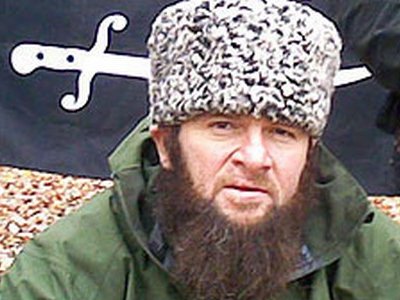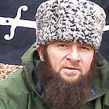
US Designation of Caucasus Emirate Leader as Terrorist Will Have Little Impact
Publication: Eurasia Daily Monitor Volume: 7 Issue: 127
By:

The US and Russian presidents’ nibbling at hamburgers has had little, if any, effect on the situation in the North Caucasus. Even the US State Department’s decision to designate Doku Umarov as a would-be threat to American interests (www.rus.ruvr.ru, June 24) might be seen as nothing but a symbolic gesture made to gratify the Russian side before President, Dmitry Medvedev, embarked on his official visit to the United States, given that Umarov’s newly acquired status has virtually no impact on his position in the North Caucasus. Umarov can hardly have any bank accounts in America, and it is unlikely that he will travel to the US to undergo medical treatment of some kind or will insist on meeting with US President, Barack Obama. In all probability, Umarov’s new status is just a small gesture in big diplomacy that will have no real consequences.
It is worth mentioning that the United States reaction to Umarov was quite belated given the well known fact that he had already in the fall of 2007 declared the United States (as well as Great Britain and Israel) as his enemy and expressed his readiness to fight against it (www.lenta.ru, July 1). Thus, the US government’s response came two and a half years late and merely as a public opinion tool. On the other hand, the very same development was seen in Russia as an additional argument to justify Moscow’s policy in the North Caucasus –something that is very important for Russian society. Although the US position is usually criticized by the Russian public, the Obama administration’s move in relation to Umarov is an invaluable step for Moscow that it will try to use to the advantage of its domestic policy.
Meanwhile, rebels in the North Caucasus have been striking Russian interests virtually across the entire region except for the republics of Adyghea and North Ossetia. This past week, like the previous ones, has not been less problematic for the Dagestani leadership. Two officers were killed during the armed attack on a police patrol on the evening of June 24 in Dagestan. One day later, in the Dagestani village of Lenin-aul, a police major was shot dead when his car was attacked by militants. And on June 26, one alleged rebel and an officer from a Special Forces unit were killed and another officer wounded in a shootout during an operation in Dagestan’s Karabudakhkent district. Those massive assaults against the police caused public outrage since the population cannot help seeing that local police are incapable of guaranteeing their own security (www.dagestan.kakaz-uzel.ru, June 17).
Ingushetia’s leader, Yunus-Bek Yevkurov, flew to Strasbourg, France to declare that everything is wonderful in his homeland. It would be hard to think of a less suitable person to brief the members of the Parliamentary Assembly of the Council of Europe (PACE). Apparently, the killing of Said Buryatsky, one of the major ideologues of the resistance movement, and the capture of Emir Magas (aka Ahmed Yevloev or Ali Taziev), the leader of the Ingush jamaat, that followed were hastily assessed as marking the end to the armed resistance in Ingushetia. The loss of their leaders, though, has only been felt slightly by the members of Ingushetia’s Shariat Jamaat, since the number and intensity of rebel strikes have at least not been on the decline. On June 23, unidentified men perpetrated an attack on the Volga-17 checkpoint where a regiment from the central Russian city of Belgorod is deployed. Then there was an attack on a security post near the village of Yandar in Ingushetia’s Nazran district. On June 25, an unidentified man detonated an explosive device on Moskovskaia Street in Nazran, Ingushetia’s former capital. The explosive had been purposely placed in the ground to target a car that was driven by Zaur Tymgoev, an Ingushetia liaison officer in the Russian interior ministry. The same day, in a second attack, two Russian traffic police (GIBDD) officers were shot and later died enroute to the hospital. The following day, on June 26, Rashid Azhigov, the commander of the local patrol police unit in the town of Malgobek was injured after an explosive device was detonated by unidentified men. He later died in the hospital. And on June 27, on the outskirts of Malgobek, a security forces’ armored vehicle was fired upon. Hence we see how “pacified” Ingushetia is today. In addition, many young men continue to join rebel groups operating in the mountains (www.russian.rfi.fr, June 26).
Kabardino-Balkaria has also joined the list of North Caucasus republics where militant groups are most active, and reports coming from that republic are no different from the other places in the restive region. In Kabardino-Balkaria’s Chegem district, two unidentified men perpetrated an armed assault on local security forces on June 25. As a result, one police officer was killed and the other was wounded. In Kabardino-Balkaria’s Baksan district on June 26, bomb disposal experts defused an explosive device that had been place near a convenience store. And in the Elbrus district, a handmade explosive device was detonated on June 27.
As far as Chechnya is concerned, the Russian authorities have started a massive operation to capture Doku Umarov alive. After Emir Magas was arrested in a mysterious operation, the Chechen authorities no longer simply want to kill Umarov: their vainglory demands that they capture the rebel leader alive. In one such operation, a police officer was killed in the village of Shalazhi (www.chechnya.kavkaz-uzel.ru, June 24).
Simultaneously, the Russian authorities have been hunting the people who they allege are rebel associates. Any undesirable person could fall into that category. On June 23, for example, two men were arrested in the Grozny district of Chechnya. One of them had been a member of a rebel group several years ago and the other had been providing assistance to illegal armed formations. A former militant was detained in the village of Ilinovskaia and a former rebel associate was detained in the village of Prigorodnoe. One day later, on June 24, a resident of the Chechen capital Grozny was detained on charges of participating in the armed resistance movement, and on June 25 two alleged rebel accomplices and a 19-year-old suspected of recruiting people for the rebel underground were arrested. This type of news is alarming the local population, who consider those arrests as pressure and intimidation. The authorities are supposedly using this tactic to prevent young people from joining the rebels in the mountains.
In conclusion, the past week in the North Caucasus has not been any more peaceful than previous ones. Daily killings of representatives of the Russian authorities and law enforcement agencies have been causing concern and alarm for the future of the local population. It is not surprising that many locals, particularly the Russian language speakers, continue to leave the region in mass numbers.




